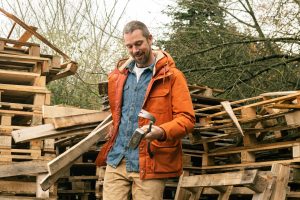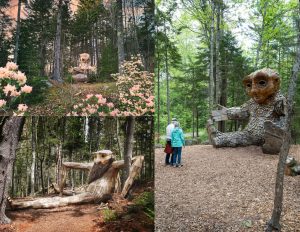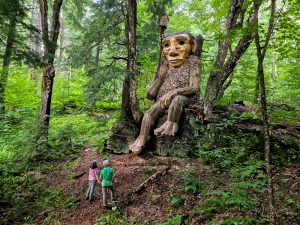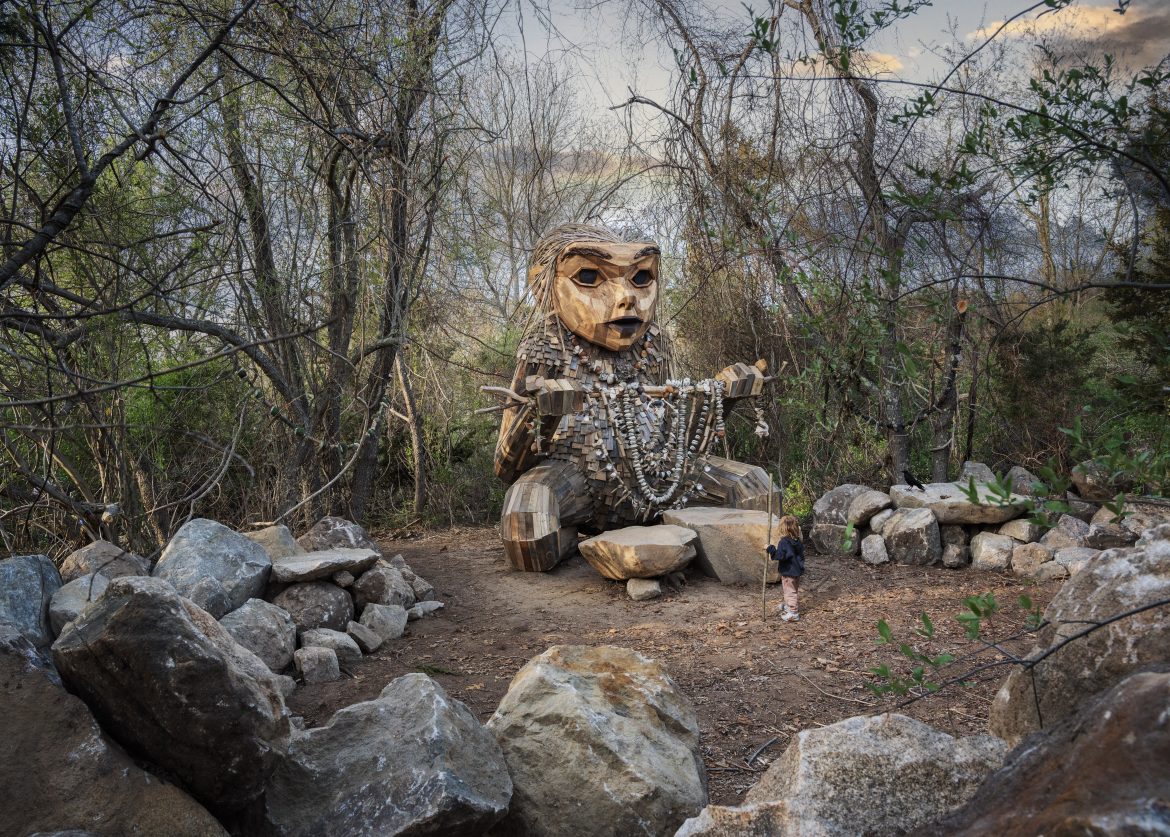Using reclaimed materials, Thomas Dambo has built eight massive troll sculptures and counting in New England and many more worldwide.
By Kelly Chase
Standing close to 16 feet tall and made of about five tons of recycled materials are two trolls lurking in Ninigret Park in Charlestown, Rhode Island. Danish artist Thomas Dambo erected them in the summer of 2024 with the help of the local community, and the state plans to install more. “This year the Dambo team will return to Rhode Island to complete the troll trail with two additional installations,” says Louise Bishop, South County Tourism Council President. Since the two trails went up last summer, the county has seen an increase in visitors. “In the first seven days after the ribbon cutting, there were 6,300 visitors,” says Bishop. “Five weeks later, there were over 50,000.”

Dambo has created hundreds of trolls across the world in 20 countries. Here in New England, he has built eight: five in Maine, another in Vermont, and so far, two in Rhode Island (soon to be four). Dambo uses discarded and recycled materials for all his projects, and he works with volunteers in local communities. “Pretty much all of my life has been centered around recycling and upcycling,” he says. “I’ve built countless installations and sculptures, all with the same focus to limit our world’s trash by showing us all how beautiful and valuable our trash is.”
Many of his early works were conceived and assembled in Denmark, but over the years, his projects gained international fame. Dambo studied at the Kolding School of Design in Denmark, where one of his first reclaimed materials projects was Happy City Birds; he built birdhouses from discarded materials, painted them a variety of bold colors, and placed them around the city. His trolls came to fruition at a Danish music festival in 2014, and soon after, he was asked to travel to Culebra, Puerto Rico, where he built Hector the Protector on a small jetty on the coast.

Each troll has a story, such as Little Tilde, a troll in Copenhagen who hides in the woods because he is shy around humans, or Greta Granite in Rhode Island, who shows the importance of the state’s most predominant mineral. “Thousands of volunteers have helped me take apart hundreds of tons of pallets and scrap wood that now over 10 million people have gone to visit, while all are returning home with a valuable lesson that something made of something old can be just as good as something made from something new,” he says.

Dambo’s first New England project was in the Coastal Maine Botanical Gardens, where he built the Guardians of the Seed: five trolls who aim to teach visitors the importance of forest preservation. “When we met Thomas Dambo in 2020, we felt his goals for creating sustainable art, collaborating with communities, and encouraging ‘troll hunters’ to get outside into nature was a perfect alignment,” says Katie Hey, Marketing and Communications Director at Coastal Maine Botanical Gardens.

The larger-than-life creatures were an immediate hit, says Hey. Visitation to the gardens more than doubled during their inaugural year. Four years later, the trolls are still bringing in first-time visitors. “We love that the trolls have the power to attract visitors to an environment they might not traditionally visit,” says Hey. “And when they get here, we can teach them about caring for the planet and show them all of the wonderful parts of our gardens.”

In the summer of 2023, Dambo executed his project Way of the Bird King, and he spent 100 days traveling across the United States installing 10 sculptures in various states, from Pia Peacekeeper in Washington State to Lost Finn in Vermont. The latter caused so much traffic that local officials had to conceal his location until further notice.
The following year, Dambo ventured to Rhode Island. With the help of hundreds of local volunteers, he assembled Erik Rock, whose hair is made of burnt maple branches, and the aforementioned Greta Granite, who holds an array of necklaces made from seashells, stones, glass, and driftwood.
According to Bishop, the goals for Dambo’s Rhode Island projects have been threefold: providing art that reaches all age groups, showing people that recycled materials can be a thing of beauty, and, in addition, a creative economic driver to the state. “One of the most surprising things we experienced was the sheer volume of volunteers,” she says, adding that a few local contractors stopped by to pitch in. “This truly was a community project that has brought so much joy to so many!”
In the United States, 12 million tons of scrap wood are driven to landfills yearly. According to Dambo, that’s 2.5 million trolls. “Probably a lot more trolls than we need, but my point is that we could use our waste for so many better things than to grow our landfills bigger and bigger,” he says.
Dambo says that most people have the notion that trash is dirty, useless, and even dangerous. With each sculpture, he hopes to change that perspective. “There is a saying that one man’s trash is another man’s treasure, and if we would understand the full meaning of this sentence: that trash equals treasure, and trash equals wealth and opportunity, then we would also understand our world is actually not drowning in trash, it’s filled with wealth and opportunity to build a better world,” he says.




